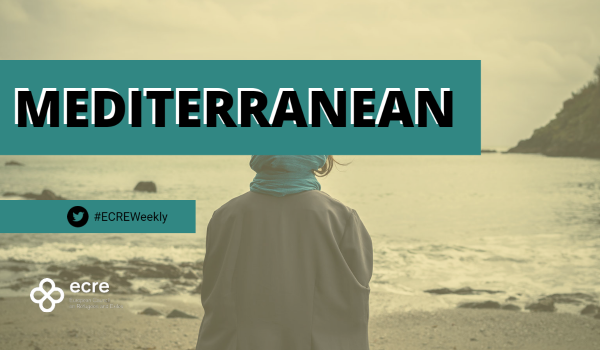- There has been a major decrease in the number of recorded irregular crossings in the Mediterranean.
- Although the number of recorded deaths and disappearances in the Mediterranean fell in 2024, at least 2,300 lives may have been lost.
- The European Court of Human Rights (ECtHR) has ruled that Greece illegally deported a woman to Türkiye in 2019 and applied a ‘systematic practice of pushbacks’.
There has been a major decrease in the number of recorded irregular crossings in the Mediterranean. According to preliminary data published by the European Border and Coast Guard Agency (Frontex) on 14 January, there was a 59% decrease in the number of recorded crossings on the Central Mediterranean route in 2024 compared to the previous year. Despite this decrease, Frontex still recorded 66,766 crossings via this particular route, making it the second most widely used in 2024 after the Eastern Mediterranean route (69,436) which saw a 14% increase. The decrease in the number of recorded irregular crossings via the Central Mediterranean route was a major factor in the 38% decrease in the overall number of recorded irregular border crossings into the EU in 2024 (approximately 239,000).
The decrease in the number of recorded irregular crossings in the Mediterranean was accompanied by a decrease in the number of recorded deaths and disappearances. According to data published by the International Organization for Migration’s (IOM) Missing Migrants Project, 2,333 people on the move were recorded as dead or missing in the Mediterranean in 2024 compared to 3,155 in the previous year (26% decrease). Of the 2,333 people included in the IOM statistics in 2024, 1,699 (73%) died or went missing on the Central Mediterranean route (33% decrease compared to 2023).
The European Court of Human Rights (ECtHR) has ruled that Greece illegally deported a woman to Türkiye in 2019. In a judgment issued on 7 January, the ECtHR found that the woman, a Turkish citizen identified as ‘A.R.E.’, who had entered Greece in May 2019 in order to seek asylum, had been illegally detained and subsequently sent back to Türkiye without her asylum request having been considered. The court also stated that there were “strong indications” to suggest that there had been a “systematic practice of ‘pushbacks’ of third-country nationals by the Greek authorities, from the Evros region to Türkiye”. The ruling is particularly significant as it is the first time that the ECtHR has ruled on Greece’s pushbacks. A.R.E’s lawyer, Maria Papamina from ECRE member organisation the Greek Council for Refugees (GCR), described the ruling as a “landmark judgment”. “The ECtHR’s recognition of this illegal practice of the Greek authorities is a vindication for the thousands of victims who denounce the Greek authorities’ pushbacks at the Greek-Turkish border”, she said, adding: “Greek authorities must stop this illegal practice”. GCR director, Lefteris Papagiannakis, said: “The Court saw a pattern and decided to punish these violations (…) It decided that it was not acceptable”. He also described the ruling as “hugely important” and said that it would serve as a “pilot case” for other pending cases involving allegations of pushbacks against Greece. The ECtHR ordered Greece to pay A.R.E. € 20,000 in damages.
Related articles
- MEDITERRANEAN: NGOs accuse Greece of continuing to subject people in detention to ‘inhuman’ treatment ― Sharp rise in number of child arrivals in Greece and ‘alarming conditions’ in refugee camps ― Major increase in number of arrests for ‘people smuggling’ in Greece ― Council of Europe criticises conditions in pre-removal detention centres in Italy ― Geo Barents rescue vessel ceases operations ― Search and rescue NGOs fear ‘Flows Decree’ could further criminalise their activities (December 2024)
- MEDITERRANEAN: People trapped in buffer zone finally allowed to enter Cyprus ― NGO report reveals more evidence of pushbacks in Greece ― Italy removing staff from migration centres in Albania ― Decision about Malta’s jurisdiction in El Hiblu 3 case due in January 2025 (November 2024)

